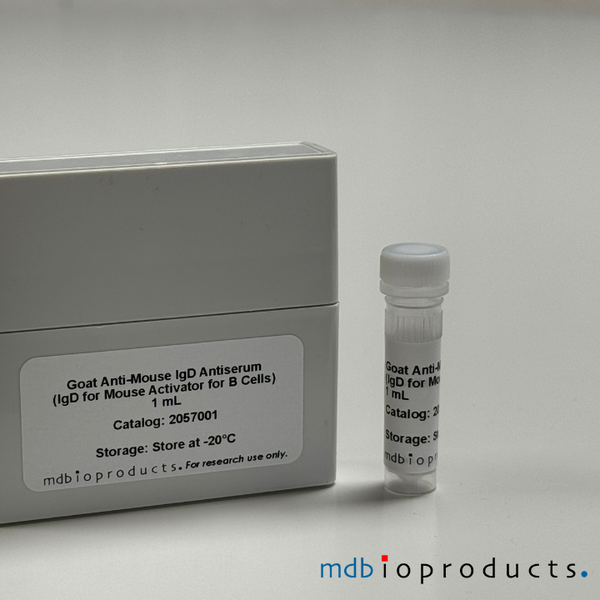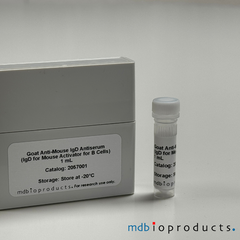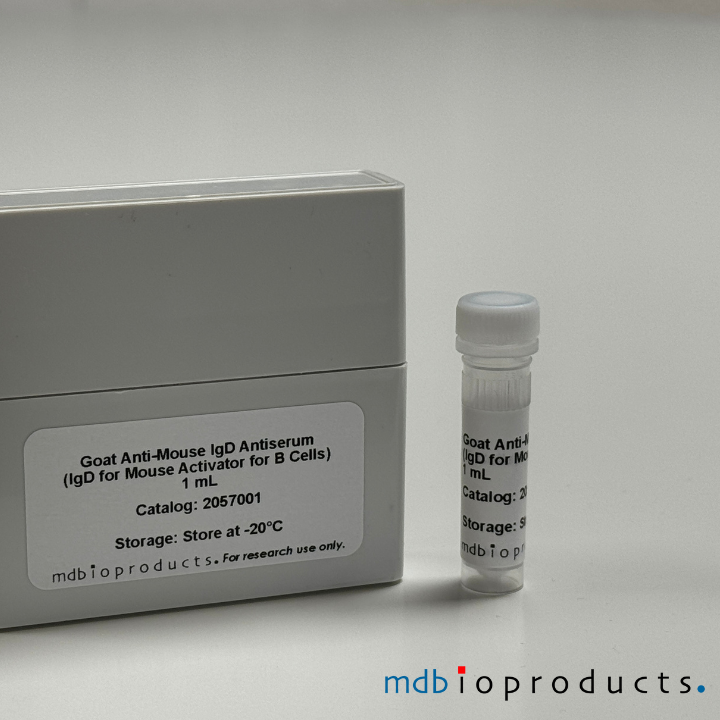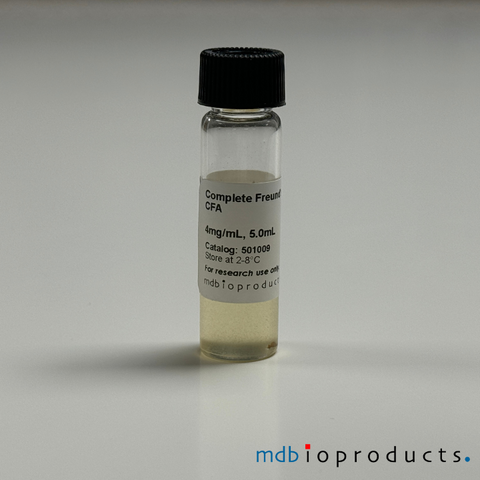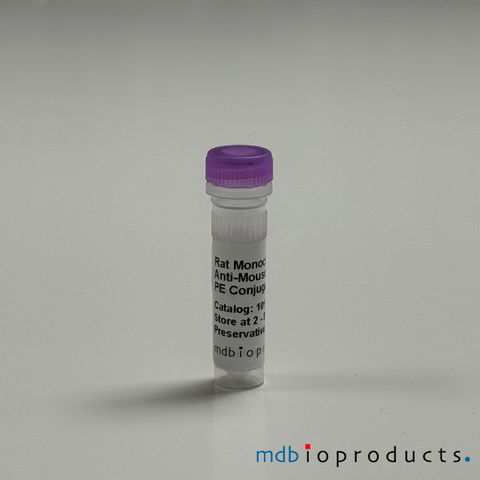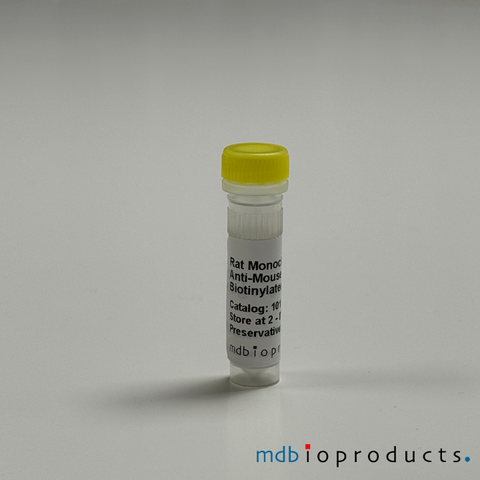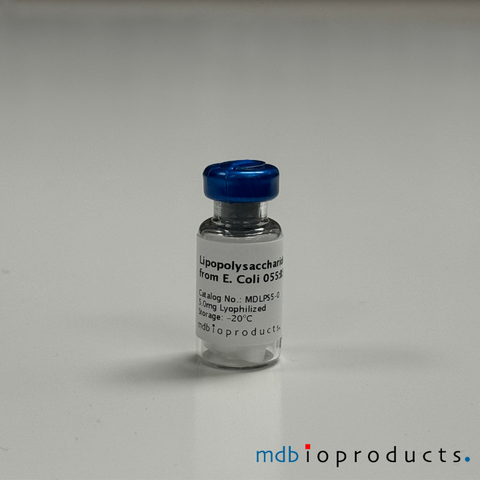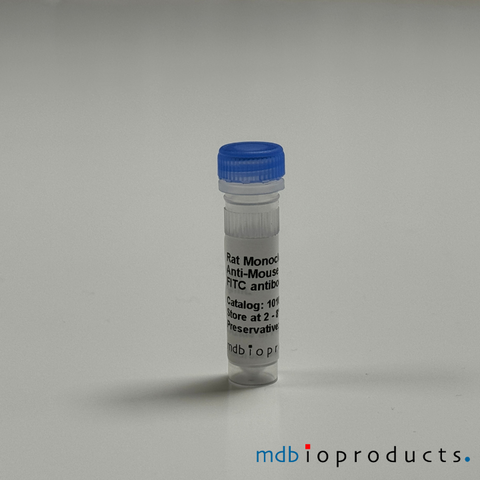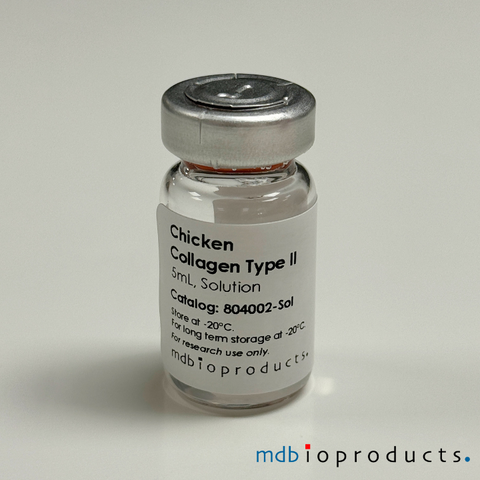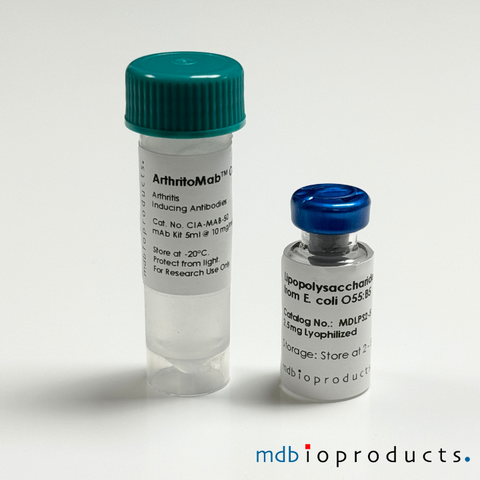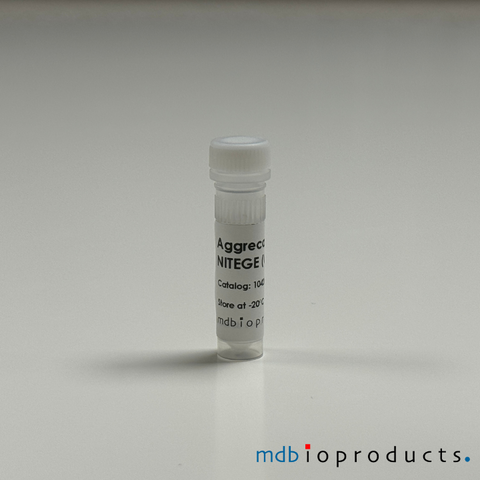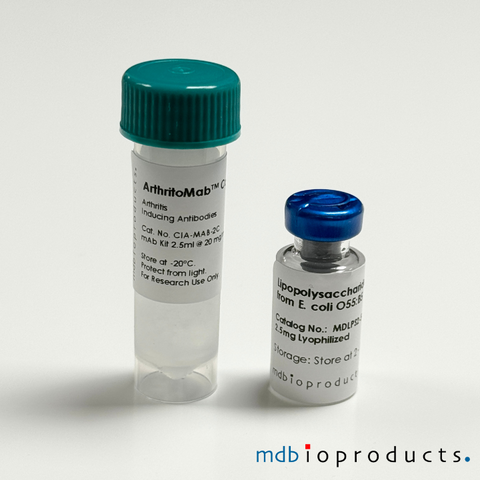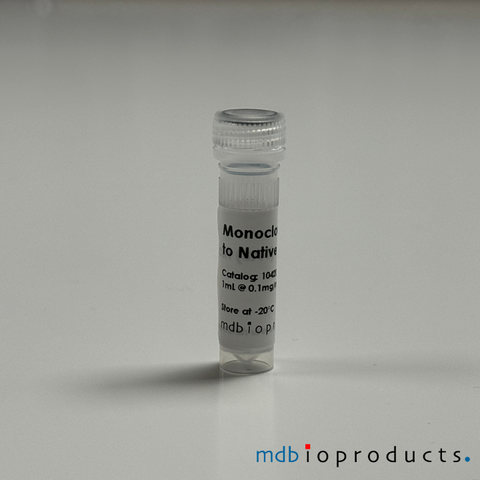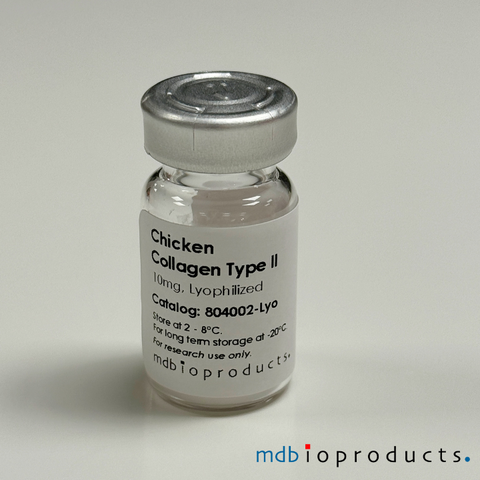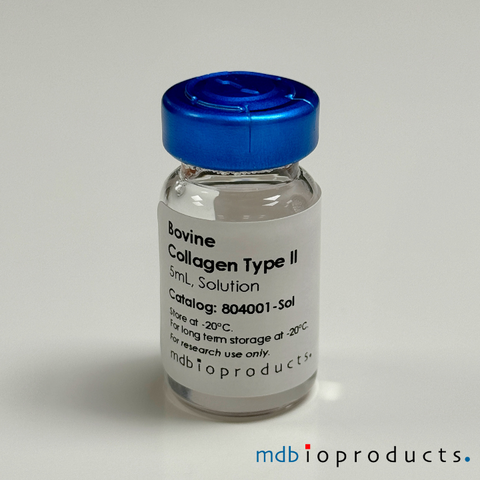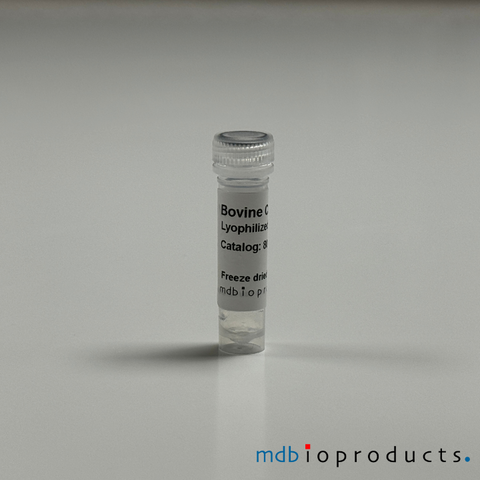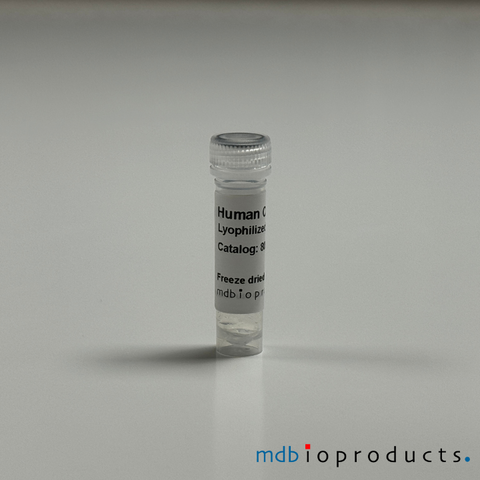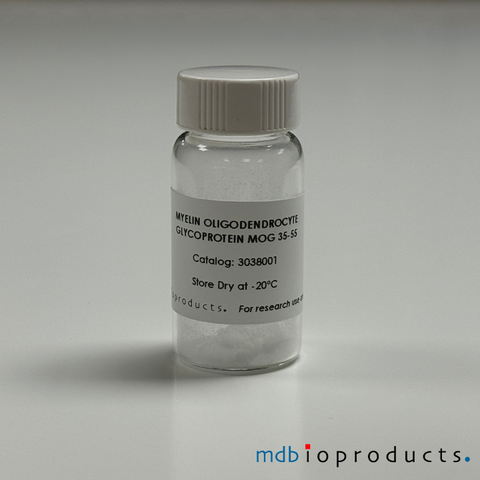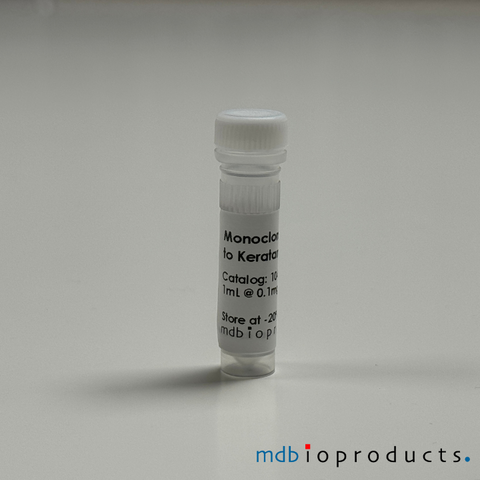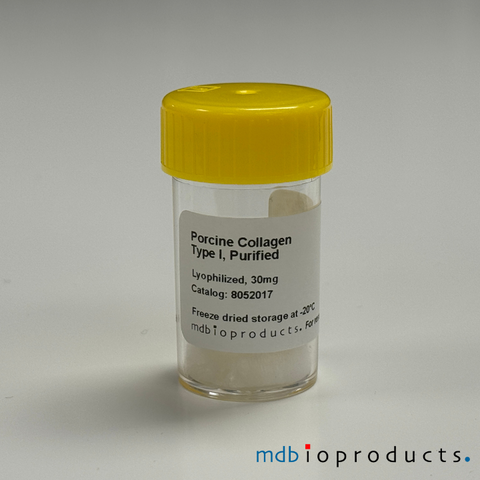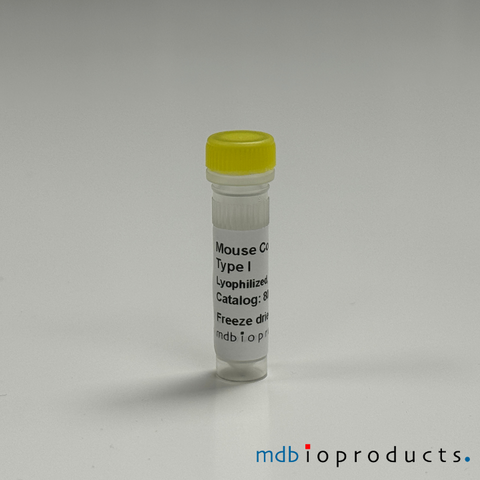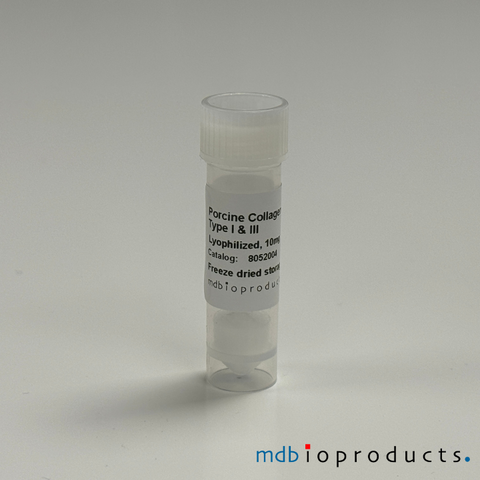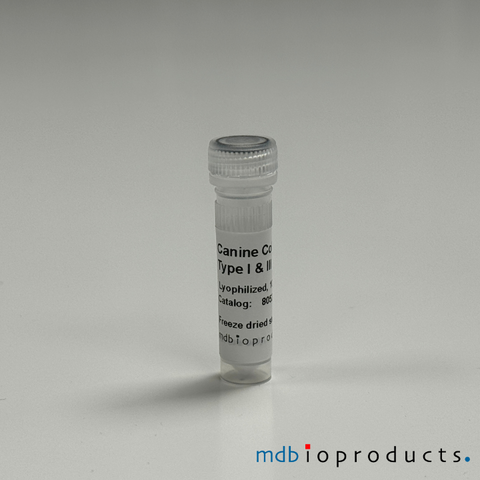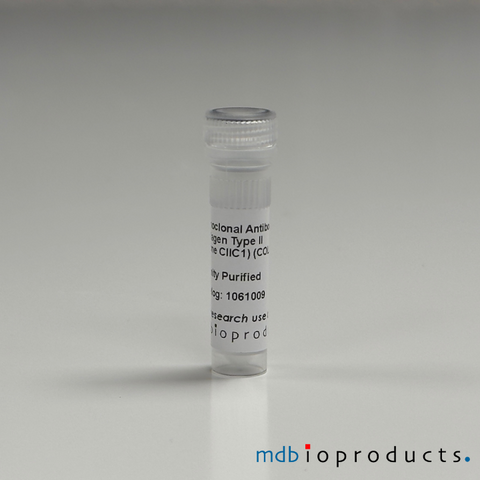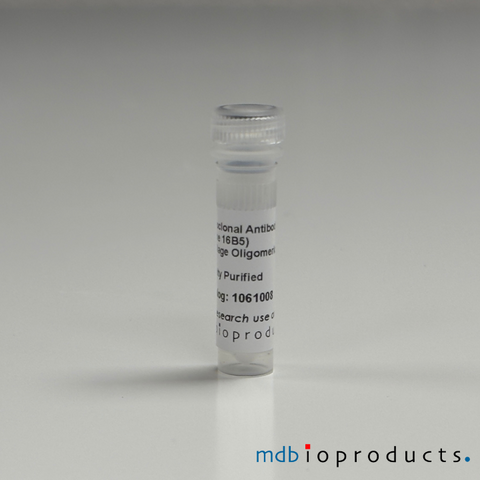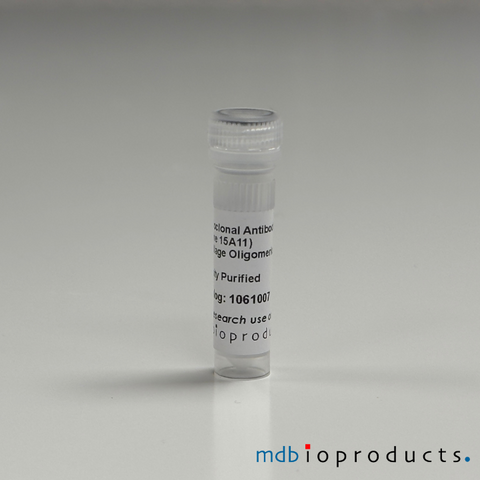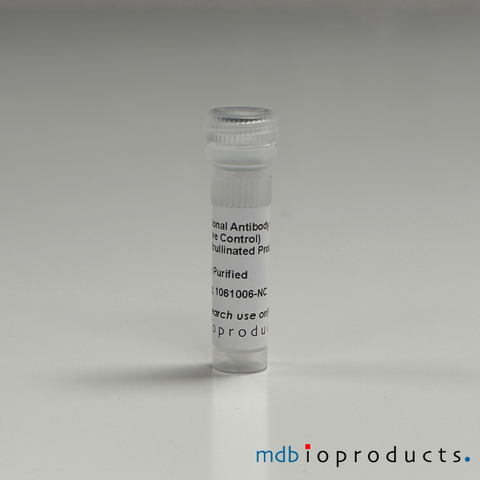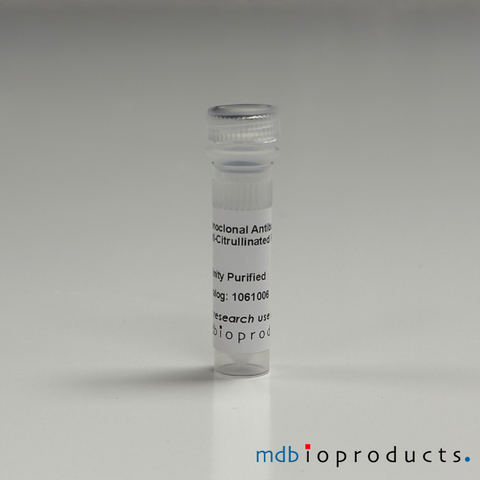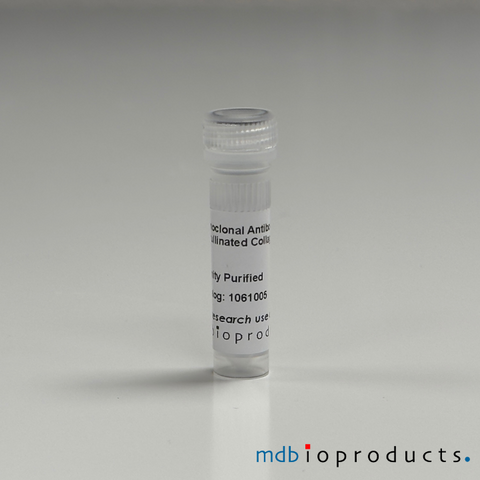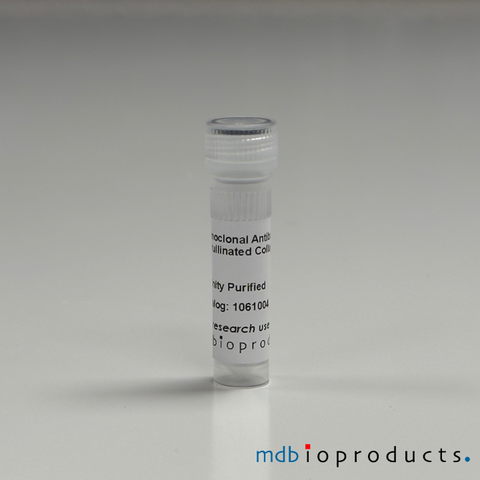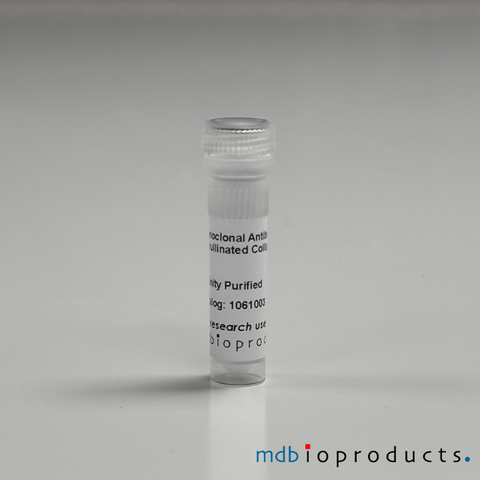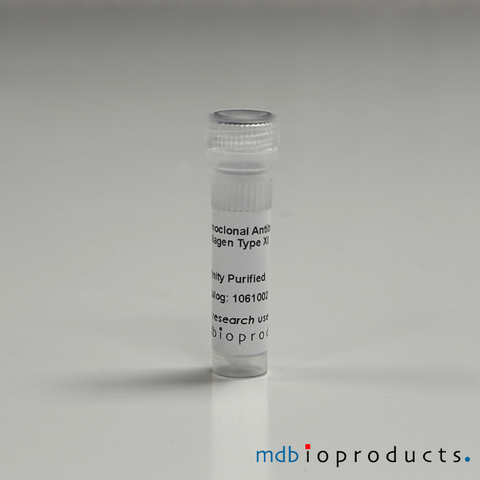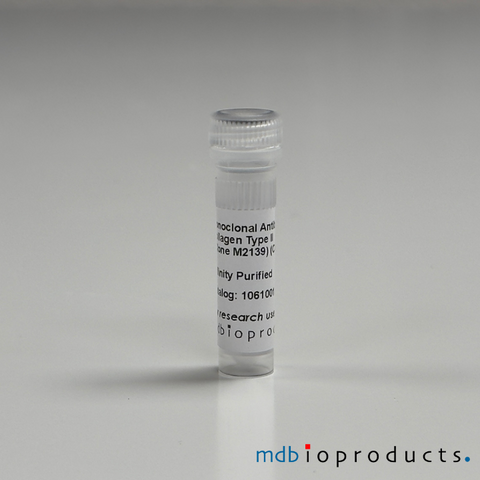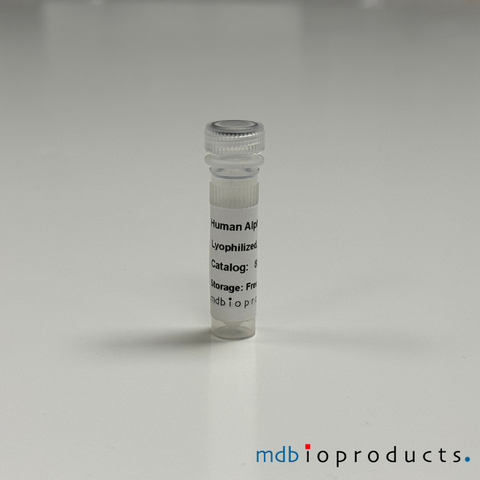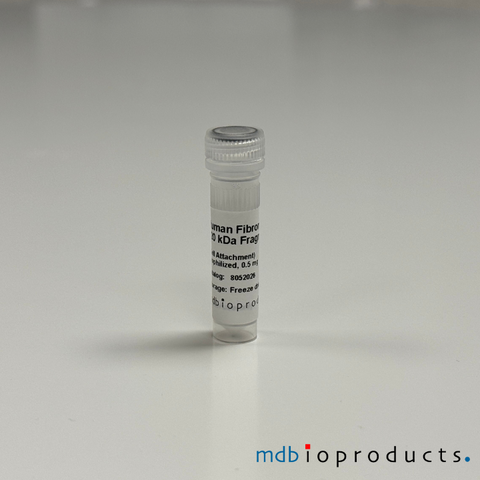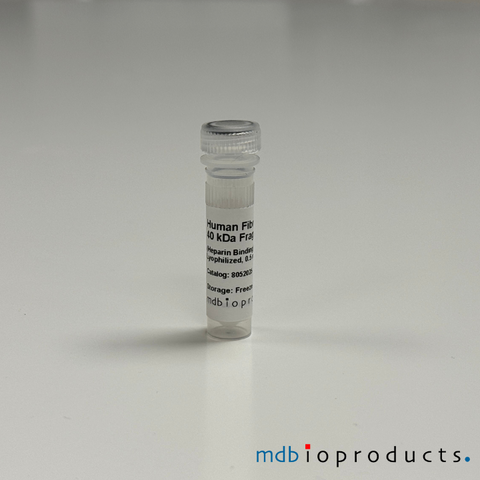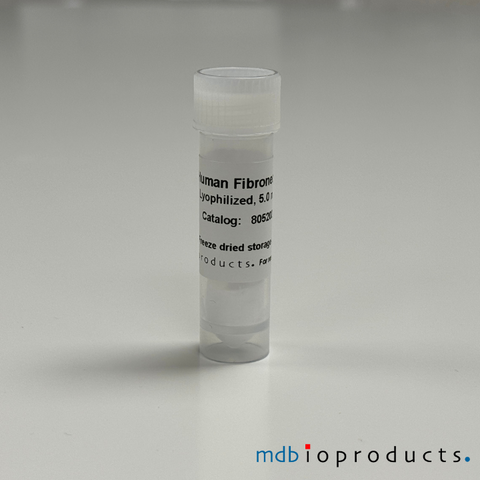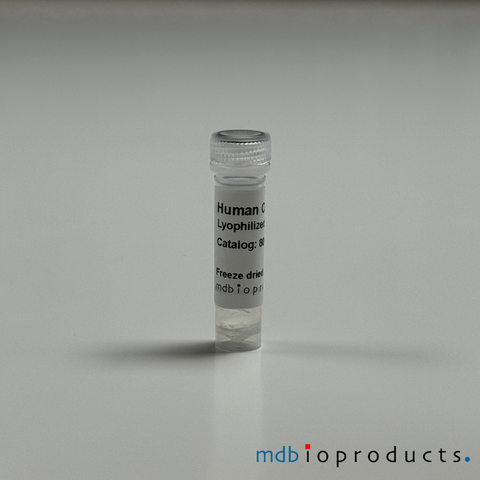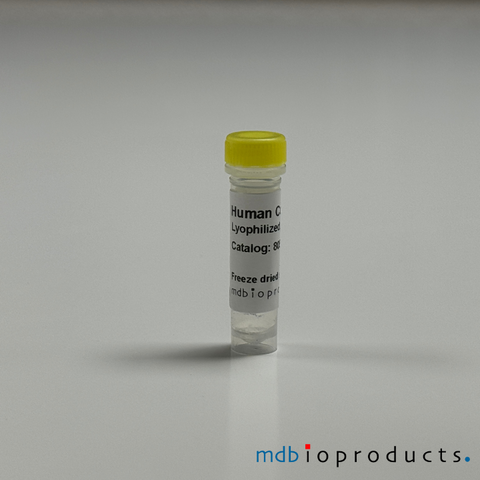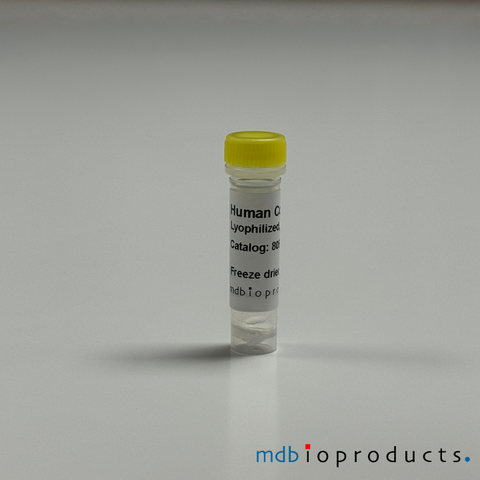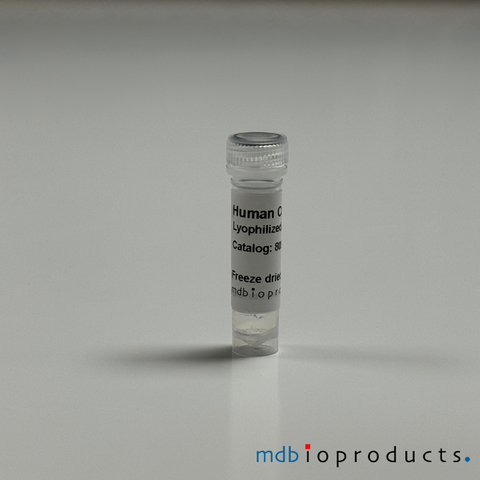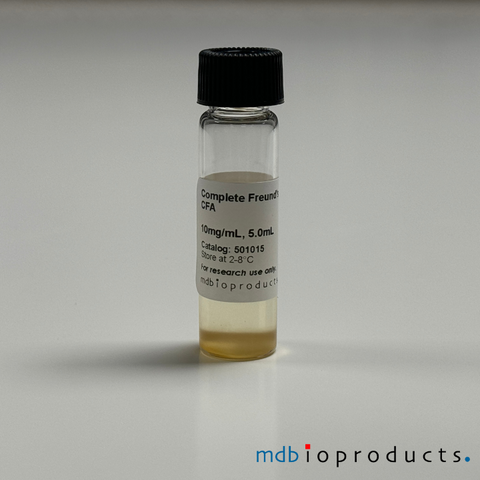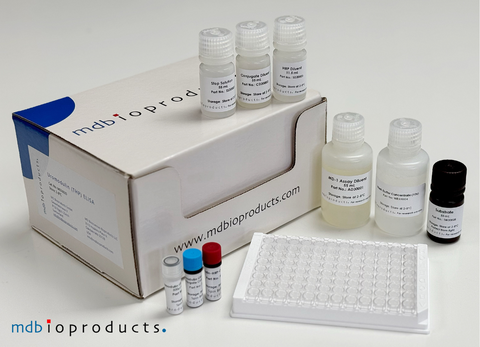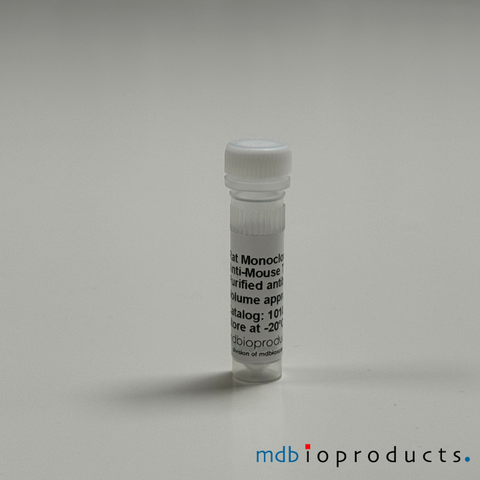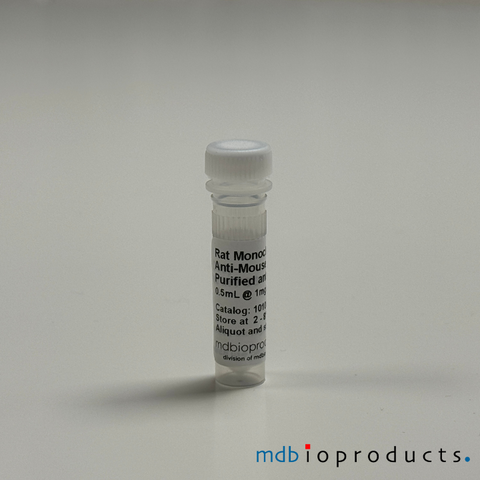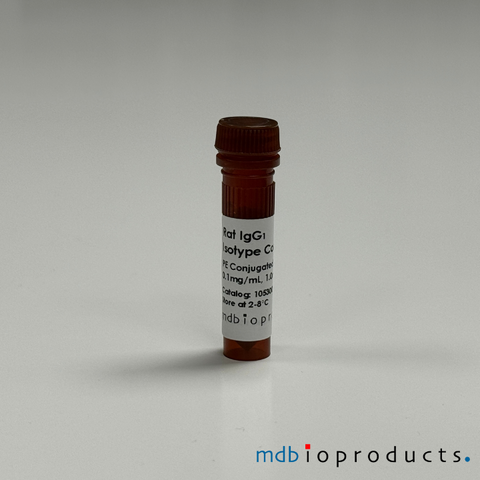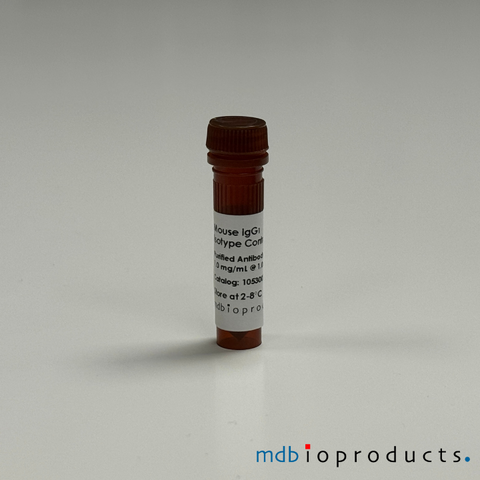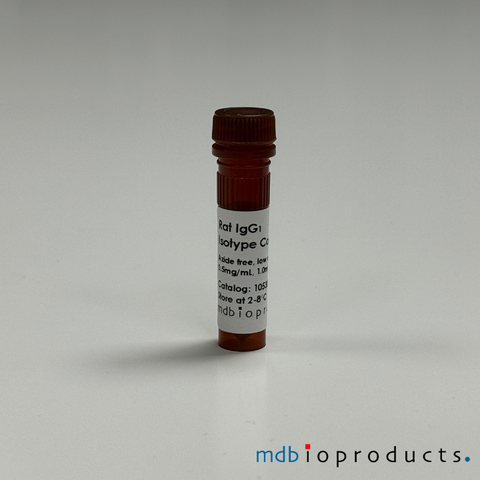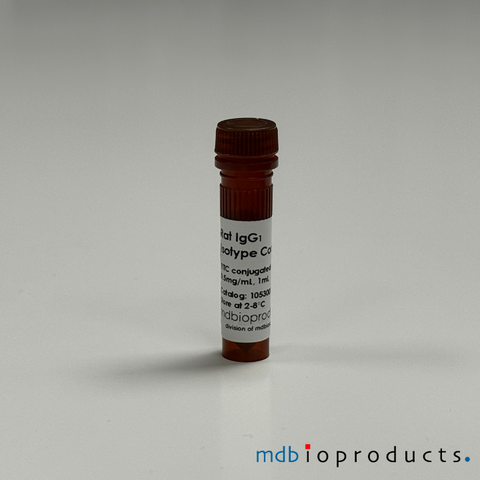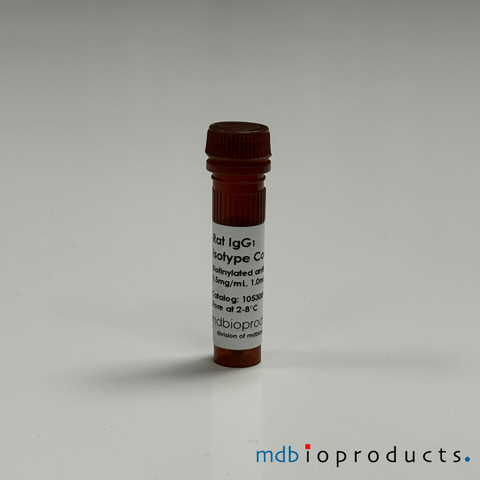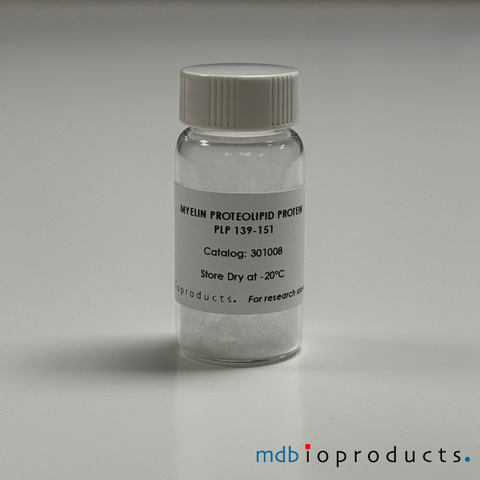Goat anti-Mouse IgD, Antiserum, 1 mL
Immunoglobulin D activator for B-cells. Preservative-free for in vivo application. Immunoglobulin D (IgD) is an antibody isotype that is found primarily on mature B-cells as part of the B-cell receptor (BCR)...
Antiserum
2057001
Immunoglobulin D activator for B-cells. Preservative-free for in vivo application.
Immunoglobulin D (IgD) is an antibody isotype that is found primarily on mature B-cells as part of the B-cell receptor (BCR) complex. Clustering of the BCR due to antigen binding leads to activation of B-cells that can result in a number of outcomes including proliferation, differentiation, and tolerance.
The ability to activate B-lymphocytes using polyclonal antisera recognizing anti-IgD is useful for the study of B-cell function (Finkelman, et al., 1985; Nguyen, et al., 2014). Anti-IgD is particularly suited for this application because soluble IgD is present in extremely low levels in serum (<0.25% of total immunoglobulin) and will not interfere with B-cell activation in a whole blood-based or in vivo setting. (In contrast, high levels of circulating IgM will typically block B-cell activation by anti-IgM in whole blood.) Such a methodology can be used to rapidly test the efficacy of B-cell inhibitory agents in a cellular, ex vivo, or in vivo context (Coffey, et al., 2012).
References/Citations:
Lee, S., Yang, J. I., Lee, J. H., Lee, H. W., & Kim, T. J. (2022). Low-Level Expression of CD138 Marks Naturally Arising Anergic B Cells. Immune Network, 22.
Bame, E., Tang, H., Burns, J. C., Arefayene, M., Michelsen, K., Ma, B., ... & Mingueneau, M. (2021). Next-generation Bruton's tyrosine kinase inhibitor BIIB091 selectively and potently inhibits B cell and Fc receptor signaling and downstream functions in B cells and myeloid cells. Clinical & translational immunology, 10(6), e1295.
Alvarenga, I. C. (2021). Extrusion process to retain resistant starch in a pet food for the purpose of altering colonic fermentation end products that benefit dog health (Doctoral dissertation, Kansas State University).
Tan, C., Hiwa, R., Mueller, J. L., Vykunta, V., Hibiya, K., Noviski, M., ... & Li, Z. (2020). A negative feedback loop mediated by the NR4A family of nuclear hormone receptors restrains expansion of B cells that receive signal one in the absence of signal two. bioRxiv.
Rip, J., de Bruijn, M. J., Kaptein, A., Hendriks, R. W., & Corneth, O. B. (2020). Phosphoflow Protocol for Signaling Studies in Human and Murine B Cell Subpopulations. The Journal of Immunology.
Noviski, M., Mueller, J. L., Satterthwaite, A., Garrett-Sinha, L. A., Brombacher, F., & Zikherman, J. (2018). IgM and IgD B cell receptors differentially respond to endogenous antigens and control B cell fate. eLife, 7, e35074
Nguyen, T., & Morris J. (2014). Signals from activation of B-cell receptor with anti-IgD can override the stimulatory effects of excess BAFF on mature B cells in vivo. Immunology Lett., 161(1), 157-164.
Coffey, G., DeGuzman, F., Inagaki, M., Pak, Y., Delaney, S., Ives, D., Betz, A., Jia, Z., Pandey, A., Baker, D., Hollenbach, S., Phillips, D., & Sinha, U. (2012). Specific Inhibition of Spleen Tyrosine Kinase Suppresses Leukocyte Immune Function and Inflammation in Animal Models of Rheumatoid Arthritis. J. Pharm. and Exp. Therapeutics., 340(2), 350-359.
Finkelman, F., Smith, J., Villacreses, N., & Metcalf, E. (1985). Polyclonal activation of the murine immune system by an antibody to IgD. VI. Influence of doses of goat anti-mouse delta chain and normal goat IgG on B lymphocyte proliferation and differentiation. Eur J Immunol., 15(4), 315-320.
Product Insert (PDF) - Informational use only. Please refer to insert included with product.
Data/Specifications:
- Format: 1 ml per vial
- Host: Goat
- Reactivity: Mouse immunoglobulin Cδ chain
- Buffer: None
- Preservative: Preservative-free for in vivo application, 0.2 μm sterile-filtered
- Storage: Short term at 2- 8°C. For long term storage, -80°C is recommended. Avoid multiple freeze- thaw cycles. Should be kept sterile. Can be re-filtered if necessary.
Related Products
Additional products you might interested in.
-
Complete Freund's Adjuvant, 4 mg/mL (5 mL)Complete Freund's Adjuvant (CFA or FCA) is 4 mg/ml M. Tuberculosis (non-viable) in mineral oil. For in-vivo/in-vitro studies. Typically used for th...
-
T1/ST2 (IL-33 R) Mouse, Monoclonal Antibody, PE Conjugated, 0.1 mLMouse T1/ST2 (IL-33 R) PE conjugated monoclonal antibody (Clone DJ8, Host / Isotype Subclass: Rat IgG1, light chain not isotyped) for the identific...
-
T1/ST2 (IL-33 R) Mouse, Monoclonal Antibody, Biotinylated, 0.5 mLMouse T1/ST2 (IL-33 R) biotinylated monoclonal antibody (Clone: DJ8, Host / Isotype Subclass: Rat IgG1, light chain not isotyped) for the identific...
-
Lipopolysaccharide (LPS), 5.0 mgHighly purified LPS for in vivo and in vitro use. Lipopolysaccharides (LPS), also known as lipoglyans and endotoxins, are large molecules consis...
-
T1/ST2 (IL-33R) Mouse, Monoclonal Antibody, FITC, 0.5 mLMouse T1/ST2 (IL-33 R) FITC conjugated monoclonal antibody (Clone: DJ8, Host / Isotype Subclass: Rat IgG1, light chain not isotyped) for the identi...
-
Collagen Type II, Chicken, Soluble, 2 mg/mLHighest quality (>99%) Collagen type II (CII) protein, purified from chicken sternum, for the induction of arthritis in the Collagen-Induced Art...
-
ArthritoMab™ Antibody Cocktail for Balb/c, DBA/1, R10.RIII, 50 mgArthritoMab™ Arthritis Inducing Antibody Cocktail is a cocktail of 4 arthritogenic monoclonal antibodies to collagen II (CII) used for inducing art...
-
Aggrecan Antibody, C-terminal neoepitope NITEGE, 100 ugAggrecan monoclonal antibody to C-terminal neoepitope NITEGE (mouse, clone BC-13). This aggrecan degradation product usually remains within the tis...
-
ArthritoMab™ Antibody Cocktail for C57BL/6, TG, 50 mgArthritoMab™ Antibody Cocktail is a reformulated cocktail of 4 monoclonal antibodies for the induction of arthritis as an alternative to the widely...
-
Lubricin Antibody, Native Bovine, 100 ugLubricin (PRG4) monoclonal antibody (mouse, clone 3A4) to detect the native form of bovine lubricin. Does not recognize reduced or denatured lubric...
-
Collagen Type II, Chicken, Lyophilized, 10 mgHighest quality (>99%) Collagen type II (CII) protein, purified from chicken sternum, for the induction of arthritis in the Collagen-Induced Art...
-
Collagen Type II, Bovine, Immunization Grade, Soluble, 2 mg/mLImmunization Grade Collagen type II (CII) protein, purified from fetal bovine articular cartilage, for the induction of arthritis in the Collagen-I...
-
Collagen Type II, Bovine, Immunization Grade, Lyophilized, 10 mgImmunization Grade Collagen type II (CII) protein, purified from fetal bovine articular cartilage, for the induction of arthritis in the Collagen-I...
-
Bovine Collagen Type VI, Lyophilized, 0.1mgBovine Collagen Type VI protein purified from bovine placenta. Collagen Type VI is the major collagenous component of microfibrils in elastic fibe...
-
Human Collagen Type IV, Lyophilized, 0.1mgHuman Collagen Type IV protein purified from human placenta. Collagen Type IV is a type of collagen found primarily in the skin within the basement...
-
Myelin Oligodendrocyte Glycoprotein (MOG 35-55), 25 mgPurified myelin oligodendrocyte glycoprotein (MOG) for MOG-induced EAE models in mouse and rat. Multiple Sclerosis (MS) is a demyelinating disease...
-
Keratan Sulfate Antibody, 100 ugKeratan sulfate (KS) monoclonal antibody (mouse, clone 5D4) used to detect KS type I epitopes and KS type II epitopes. Liquid. Store at -20° C. K...
-
Collagen Type I (Atelocollagen) Porcine, 30 mgHighly Purified Porcine Collagen Type I from porcine tendon. Lyophilized. Reconstitute to a concentration of 1-5 mg/mL. Type I collagen is the m...
-
Collagen Type I, Mouse, 1 mgPurified type I native mouse collagen from mouse tail tendon. Lyophilized. Reconstitute to yield 1-5 mg/mL collagen solution. Type I collagen is...
-
Collagen Type I and III, Porcine, 10 mgPurified type I & III native porcine collagen from pig’s tissue, 10 mg. Highest quality collagen for research use. Type I collagen is the mo...
-
Collagen Type I and III, Canine, 10 mgPurified type I & III canine collagen. Type I collagen is the most abundant collagen and is found in connective tissues including tendon, ligam...
-
Collagen Type II, Monoclonal Antibody (Clone CIIC1), 100ugThis antibody binds specifically to the C1 epitope on triple helica collagen type 2. It cross-reacts with mouse, rat, chicken, baboon and horse...
-
Cartilage Oligomeric Matrix Protein (COMP), Monoclonal Antibody (Clone 16B5), 100ugThis antibody binds to the coiled-coil domain or pentamer COMP. It cross-reacts with mouse, rat and human. Cartilage Oligomeric Matrix Protein ...
-
Cartilage Oligomeric Matrix Protein (COMP) , Monoclonal Antibody (Clone 15A11), 100ugThis antibody binds to the fourth EGF (Epithelial Growth Factor) -like domain of mouse COMP, comprising residues 232–252, called the P6 epitope...
-
ACPA (Negative Control), Monoclonal Antibody (Clone E4NG-Mutant), 100ugThis antibody is a negative control for the E4NG antibody (product number 1061006). It is the mutated version of the E4NG antibody, with identi...
-
ACPA, Monoclonal Antibody (Clone E4NG), 100ugThis antibody recognizes multiple citrullinated proteins/peptides, including CCP2, citrullinated collagen type 2 (COL2) peptides, citrullinated...
-
ACC4 (IgG2b), Monoclonal Antibody, 100ugThis antibody is an anti-citrullinated protein antibody (ACPA) that on Collagen alpha-1 (II) chain binds specifically to citrullinated C1 epito...
-
ACC4 (IgG1), Monoclonal Antibody, 100ugThis antibody is an anti-citrullinated protein antibody (ACPA) that, on Collagen alpha-1 (II) chain, binds specifically to citrullinated C1 epi...
-
ACC1, Monoclonal Antibody, 100ugThis antibody binds ACC1 to the citrullinated triple-helical collagen type II (CII) epitope (position 359-369), the C1 epitope. The ACC1 antibo...
-
Collagen Type XI, Monoclonal Antibody, 100ugThis antibody (clone L10D9) binds to the triple-helical D3 epitope on collagen XI, which is shared with Collagen type II. The antibody binds to...
-
Collagen Type II, Monoclonal Antibody (Clone M2139), 100ugThis antibody (clone 2139) recognizes the conformational J1 epitope on the triple-helical structure of the native Collagen Type II molecule. Th...
-
Alpha Fetoprotein, Human, 0.1mgAlpha Fetoprotein extracted from Human Blood Cord. Alpha-fetoprotein (AFP) is a glycoprotein produced mainly by the fetal liver, yolk sac, an...
-
Fibronectin 120 kDa Fragment Cell Attachment, Human, 0.5mgFibronectin heparin binding 120 kDa fragment. Chymotryptic digest of human plasma fibronectin. The Human Fibronectin 120 kDa cell attachment fra...
-
Fibronectin 40 kDa Fragment Heparin Binding, Human, 0.5mgFibronectin heparin binding 40 kDa fragment. Chymotryptic digest of human plasma fibronectin. Heparin-binding 40 kDa fragment of human plasma...
-
Fibronectin, Human, 5mgFibronectin from human plasma. Fibronectin is a high-molecular-weight glycoprotein of the extracellular matrix that plays a crucial role in c...
-
Human Collagen Type V, Lyophilized, 0.1mgHuman Collagen Type V protein purified from human placenta. Collagen Type V is a fibrillar collagen. Collagen Type V is essential for the fibrilla...
-
Human Collagen Type III, Lyophilized 0.1 mgHuman Collagen Type III protein purified from human placenta. Type III collagen is a fibrillar collagen, and it consists of only one collagen α ch...
-
Human Collagen Type I, Lyophilized 0.1 mgHuman Collagen Type I protein purified from human placenta. Type I collagen is the most abundant collagen and is found in connective tissues includ...
-
Human Collagen Type II, Lyophilized 0.1 mgHuman Collagen Type II protein purified from human cartilage. Collagen Type II is a fibrillar collagen, and the main component of cartilage. Type ...
-
Complete Freund's Adjuvant, 10 mg/mL (5 mL)Complete Freund's Adjuvant (CFA or FCA) is 10 mg/ml M. Tuberculosis (non-viable) in mineral oil. Typically used to induce Adjuvant-Induced Arthriti...
-
Uromodulin Glycoprotein (UMOD, Tamm-Horsfall Glycoprotein, THP) ELISAThe Uromodulin Glycoprotein ELISA kit is a 96-Well enzyme-linked immunosorbent assay used for the quantitative determination of Uromodulin Glycopro...
-
T1/ST2 (IL-33 R) Mouse, Monoclonal Antibody, 0.5 mLMouse T1/ST2 (IL-33 R) monoclonal antibody (Clone: DJ8, Host / Isotype Subclass: Rat IgG1, light chain not isotyped) for the identification and pur...
-
T1/ST2 (IL-33 R) Monoclonal Antibody, azide-free, 0.5 mLMouse T1/ST2 (IL-33 R) monoclonal antibody (Clone DJ8, Host / Isotype Subclass: Rat IgG1, light chain not isotyped), azide-free, for the identific...
-
Rat IgG1 Isotype Control, R-PE Conjugated Antibody, 0.1 mgIsotype controls are most commonly used in flow cytometry and immunohistochemistry experiments as negative controls that measure the level of non-s...
-
Rat IgG1 Isotype Control, Purified Antibody, 0.5 mgIsotype controls are most commonly used in flow cytometry and immunohistochemistry experiments as negative controls that measure the level of non-s...
-
Rat IgG1 Isotype Control, Low endotoxin, Azide-free, 0.5 mgIsotype controls are most commonly used in flow cytometry and immunohistochemistry experiments as negative controls that measure the level of non-s...
-
Rat IgG1 Isotype Control, FITC Conjugated Antibody, 0.5 mgIsotype controls are most commonly used in flow cytometry and immunohistochemistry experiments as negative controls that measure the level of non-s...
-
Rat IgG1 Isotype Control, Biotin Conjugated Antibody, 0.5 mgIsotype controls are most commonly used in flow cytometry and immunohistochemistry experiments as negative controls that measure the level of non-s...
-
Myelin Proteolipid Protein (PLP 139-151), 15 mgPurified myelin proteolipid protein (PLP) for PLP-induced EAE models in mouse and rat. Multiple Sclerosis (MS) is a demyelinating disease of the c...

